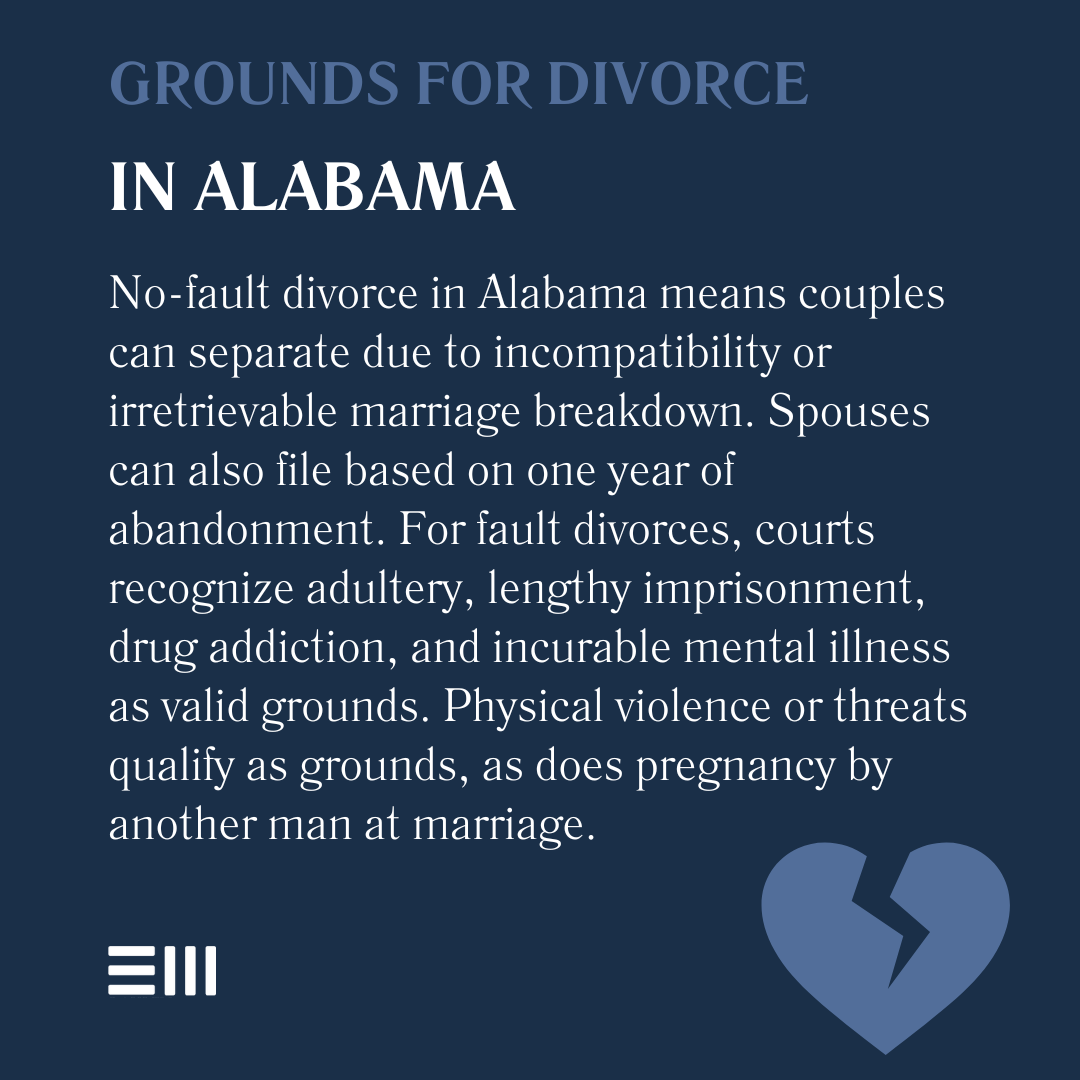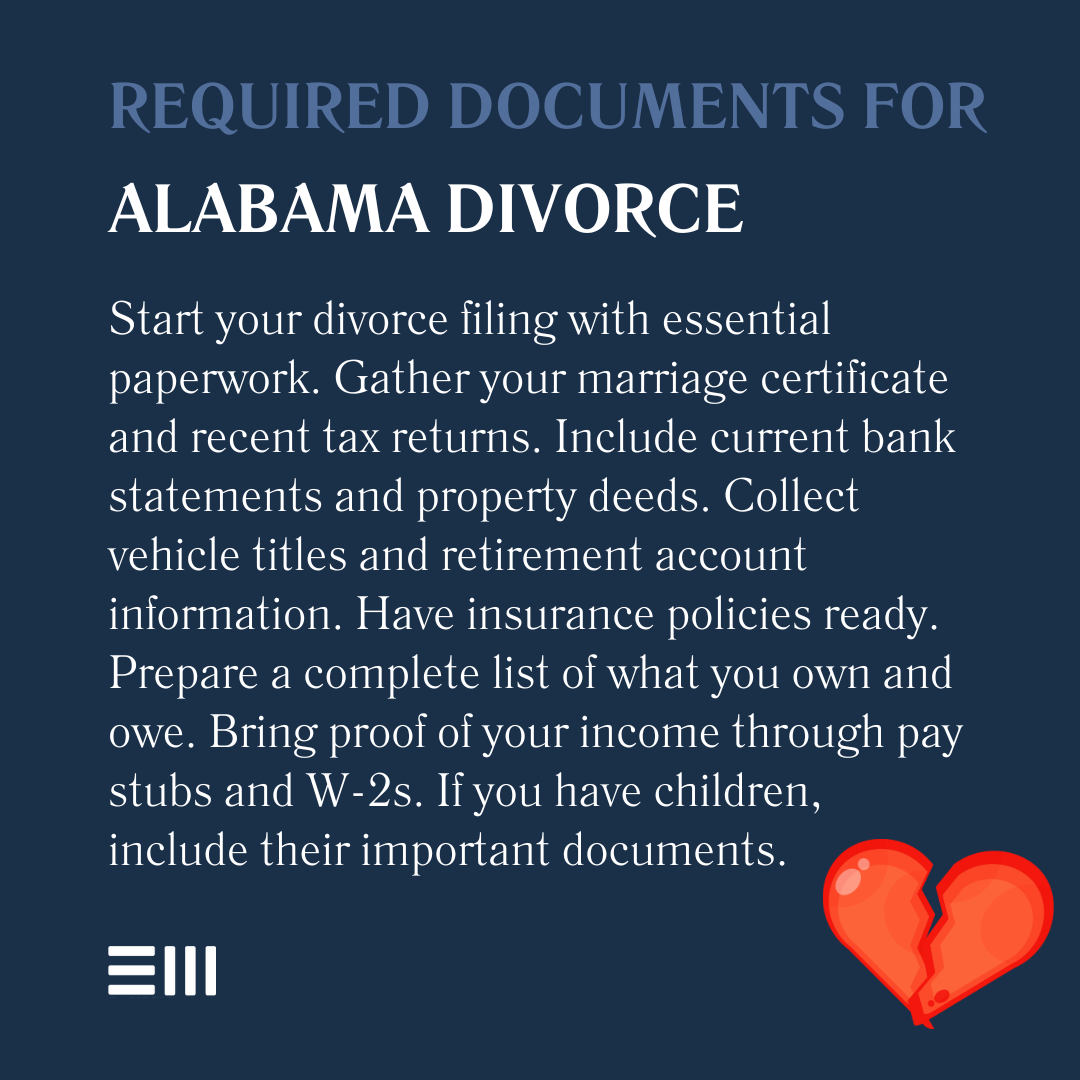In Alabama, approximately 3.6 out of every 1,000 residents filed for divorce in 2021, reflecting one of the higher divorce rates in the southeastern United States.
Behind each filing lies a unique story and set of circumstances that led to this life-changing decision.
Whether you're contemplating divorce due to irreconcilable differences or facing a contested separation, understanding Alabama's divorce process can help you navigate this challenging transition with confidence.
Initial Requirements and Residency
Before beginning your divorce journey in Alabama, familiarize yourself with the state's specific requirements.
One spouse must have been a resident of Alabama for at least six months before filing for divorce. This residency requirement helps establish proper jurisdiction for your case.
After meeting the residency requirements, you'll need to determine your grounds for divorce and gather necessary documentation.
Alabama recognizes both fault-based and no-fault grounds, giving you flexibility in how you approach your filing.
Grounds for Divorce in Alabama
Alabama courts recognize several grounds for divorce, including both fault and no-fault options. Understanding these grounds helps you choose the most appropriate basis for your filing.
No-fault grounds include:
- Incompatibility of temperament;
- Irretrievable breakdown of the marriage; and
- Voluntary abandonment for one year.
Fault-based grounds include:
- Adultery;
- Imprisonment for two years with a sentence of seven years or longer;
- Drug addiction;
- Incurable mental illness;
- Physical violence or threats of violence; and
- Pregnancy of the wife by another man at the time of marriage.
The choice between fault and no-fault grounds can impact your divorce proceedings and potentially affect property division and alimony decisions.
Required Documentation
Gathering proper documentation streamlines your divorce process and prevents delays. Organize these essential documents before filing:
- Marriage certificate;
- Tax returns (last 3 years);
- Bank statements;
- Property deeds;
- Vehicle titles;
- Retirement account statements;
- Insurance policies;
- List of assets and debts;
- Proof of income (pay stubs, W-2s); and
- Child-related documents (if applicable).
Having these documents readily available helps your attorney evaluate your case and prepare necessary court filings.
Step-by-Step Filing Process
Navigating the divorce filing process requires attention to detail and proper sequencing of legal steps. Understanding each phase helps ensure your case moves forward smoothly and efficiently.
- Complete the Complaint for Divorce: The first step involves submitting your complaint to the circuit court in your county. You'll need to provide comprehensive information about your marriage, separation, and grounds for divorce in your filing. The court requires payment of filing fees, which typically range from $200-400, though fee waivers may be available based on financial circumstances.
- Serve Your Spouse: Once your complaint is filed, you must legally notify your spouse through proper service of process. You can choose between having the sheriff's department deliver the papers, sending them via certified mail, or hiring a private process server to ensure delivery. After service is complete, documentation must be filed with the court. Your spouse then has 30 days to respond to the complaint.
- Handle the Response: After service, your case proceeds based on your spouse's response. In uncontested cases, you can move forward with drafting and finalizing a settlement agreement. For contested divorces, you'll need to prepare for temporary hearings and engage in the discovery process, where both parties exchange relevant information and documentation.
- Attend Required Hearings: Throughout your divorce, you'll need to appear at several court proceedings. These typically begin with an initial status conference where the judge reviews your case. Depending on your circumstances, you may need to attend temporary orders hearings to establish interim arrangements. The process concludes with either a final hearing for uncontested divorces or a trial for contested matters.
- Finalize the Divorce: The final phase involves obtaining your divorce decree. You'll submit the final decree for the judge's signature, incorporating any agreements or court decisions. After receiving certified copies of your divorce decree, you can begin implementing its terms, including property division, custody arrangements, and support obligations.
Following these steps methodically helps maintain compliance with Alabama court procedures while moving efficiently toward your divorce resolution. Remember to maintain detailed records of all documents and correspondence throughout the process.
Property Division Guidelines
Alabama follows equitable distribution principles when dividing marital property.
Each spouse presents evidence supporting their claim to specific assets, and the court considers various factors:
- Length of marriage;
- Age and health of each spouse;
- Economic circumstances;
- Contributions to the marriage;
- Future earning potential;
- Fault (if applicable); and
- Tax consequences.
Understanding these factors helps you prepare realistic expectations for property division outcomes.
Child Custody and Support Considerations
When children are involved, Alabama courts prioritize their best interests above all else. The court evaluates multiple factors:
- Child's relationship with each parent;
- Parents' ability to provide care;
- Child's adjustment to home and school;
- Child's preferences (if age-appropriate); and
- Parents' willingness to support relationships with both parents.
Child support calculations follow state guidelines based on:
- Both parents' incomes;
- Childcare costs;
- Health insurance expenses;
- Number of children; and
- Custody arrangement.
Understanding these factors and approaching custody discussions with a child-focused mindset helps create stable, nurturing arrangements that serve your children's long-term well-being.
Frequently Asked Questions About Filing for Divorce in Alabama
Understanding common concerns helps address uncertainties about the divorce process in Alabama.
Here are answers to questions many individuals face when considering divorce.
How Long Does a Divorce Take in Alabama?
The process typically takes 30-90 days for uncontested divorces, while contested divorces may take 6-12 months or longer.
What if My Spouse Won't Sign Divorce Papers?
Your divorce can still proceed through default judgment after proper service and waiting periods.
Do I Need an Attorney to File for Divorce?
While not required, an attorney's guidance often proves invaluable, especially for complex property division or custody matters.
How Much Does Divorce Cost in Alabama?
Filing fees range from $200-400, with total costs varying based on complexity and whether you hire an attorney.
Can I File for Divorce Online in Alabama?
Yes, some counties offer online filing systems, though complex cases benefit from traditional filing methods.
Next Steps for Your Alabama Divorce
Your path forward deserves experienced guidance and support.
Our team understands the complexities of Alabama divorce law and stands ready to protect your interests throughout the process.


